Emotional Quotient and research competency of undergraduate Students Studying Educational Research using the Collaborative Learning
Main Article Content
Abstract
This research aims 1) to compare the emotional quotient of undergraduate students before and after learning by using collaborative learning in Educational Research subject and 2) to study students’ research competency of undergraduate students after learning by using collaborative learning method. Samples were 36 Computer Science undergraduate students, Faculty of Education, Mahasarakham Rajabhat University who enrolled in Educational Research subject. The instruments used in this study were Emotional Quotient Test, Competency Assessment Test, and lesson plan. The data were analyzed by percentage, mean, standard deviation and Dependent t-test. The results showed that: 1) students’ Emotional Quotient after using collaborative learning was significantly higher than before using collaborative learning at .05 level. 2) Students assessed themselves about their research competency were at a high level. Also, the score evaluated by teachers was higher than 80%.
Article Details
บทความที่ได้รับการตีพิมพ์เป็นลิขสิทธิ์ของวารสาร สักทอง : วารสารมนุษยศาสตร์และสังคมศาสตร์ สถาบันวิจัยและพัฒนา มหาวิทยาลับราชภัฏกำแพงเพชร
ข้อคิดเห็นใดๆ ที่ปรากฎในวารสารเป็นวรรณกรรมของผู้เขียนโดยเฉพาะ ซึ่งมหาวิทยาลัยราชภัฏกำแพงเพชรและบรรณาธิการไม่จำเป็นต้องเห็นด้วย
References
The Effects of Emotional Quotient Development of Second-year Nursing
Science Students Using Group Dynamics and Informative Feedback. Journal
Of Education Mahasarakham University, 4(4), 60-65.
Bureau of Mental Health Development. (2003). Knowledge Guide for Emotional
Intelligence Development in Children 3-11 Years for Parents /Guardians.
Bangkok : Ministry of Public Health.
Chongvisal, R. (2001). Include academic articles (Volume 2) EQ : Concept to
Practice. Bangkok : DESKTOP Kanpim Printing.
Chatwirote, B. (2014, January-April). The Development of a Group Dynamic in Cooperative
Learning Model to Enhance English Student Teachers’ Teaching Competencies.
The Golden Teak : Humanity and Social Science Journal (GTHJ.), 20(1).
Department of Mental Health, Ministry of Public Health. (2000). Mental health with EQ.
Mental health conferences 2000. (Page 55-56). Bangkok : Bureau of
Mental health Promotion and Development.
_______. (2005). Emotional Intelligence Guide. Bangkok : Department of Mental Health,
Ministry of Public Health.
Department of Mental Health, Ministry of Public Health. (2001). A Develop the evaluation of
Emotional Intelligence for Thai people 12-60 year. Bangkok : Bureau of Mental
health Promotion and Development.
Health Informathion System Development Office. (2012). Emotional and Intelligence.
[Online]. Available : http://www.hiso.or.th/hiso/tonkit/tonkits_55.php [2016,
December, 14].
Khammani, T. (2010). Teaching Strategies; Knowledge for Effective Learning Management.
Bangkok : Chulalongkorn University Press.
Ministry of Education. (2011). qualification framework of bachelor degree in education
(Course five year). Attachment to the Notification of Ministry of Education
qualification framework of bachelor degree in education (Course five year).
March, 14.
Office of the National Education Commission. (2002). National Education Act 1999 adjust
edition 2002. Bangkok : Kansatsana Printing House.
Phuvipadawat, S. (2001). Learner centeredness and Authentic Assessment. Bangkok :
The knowledge Center Press.
Pornkul, C. (2011). Thinking theory and application. (2 nd ed.). Bangkok : Chulalongkorn
University Press.
_______. (2001). Child Centered. Bangkok : Chulalongkorn University Press.
Punnitamai, W. (1999). Emotional Intelligence (EQ): Happiness Index and the success
of Life. Bangkok : Super X Zone.
Srisa-ard, B. (2002). Basic Research. (7 th ed.). Bangkok : Suveriyasan Printing.
Sutthirat, C. (2011). 80 Child Centered Innovation. (4 th ed.). Bangkok :
danex-intercorporation-co-ltd.
Thongbu, S. (2012). Educational Research. (7 th ed.). Maha sarakham : Apichat kan pim.


